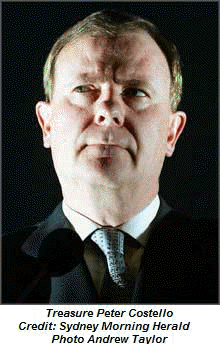|
|
|
|
|
|
|
News & Views item - May 2006 |
![]() Pin a
Leather Medal on the Treasurer. (May 11, 2006)
Pin a
Leather Medal on the Treasurer. (May 11, 2006)
Yesterday morning the ABC's Fran Kelly asked the Federal Treasurer, Peter Costello, why no new money for higher education.
Mr Costello replied that more money was going into universities than ever before. As she persisted the Treasurer talked over her repeating himself, "More money for higher education than ever before."
True?
Yes, clever, and misleading, as is attested to by the chart from the OECD 2006 Factbook. It lists 23 of the 30 OECD nations and shows that of those 23 while all increased their expenditure on "institutions in tertiary education", 12 showed a greater percentage of increase between 1995 to 2002 than Australia while ten showed a smaller percentage increase.
Furthermore, of the 23 nations five showed a decrease in "expenditure per student" while 18 increased their expenditure per student between 1995 -2002. Australia is one of the five that moved into negative territory.
|
||||
 |
Witness then the Treasurer of Australia, the would be Prime Minister of the nation, trying to score cheap points.
|
|||
The editorial in today's Age, goes further into the matter in what may the strongest questioning of the Coalition Government's approach to furthering the well-being of the nation and its people.

If you didn't read much about education and skills in the federal budget, this was because there wasn't much.
Commentators and the Opposition have rightly identified the lack of substantial investment in education and skills as a critical deficiency in a budget awash with money. It is not as though higher education and research have been well funded over the past decade.
[T]he budget forecasts that education funding as a proportion of total government expenditure will fall further up to 2010. The Government has paid some attention to vocational skills and scientific and medical research, but its piecemeal spending is small compared with the budget's big-ticket items and, of course, the $36.7 billion in tax cuts over four years.
It must be concluded that the Government has an ideological aversion to greater public funding of higher education and skills training. In the meantime, as Education Minister Julie Bishop has observed, higher education has become a focus of development in such countries as the US, Japan, China, India, Singapore, Malaysia and South Korea, which plan to "use brainpower as a catalyst for economic development".
A study by the Prime Minister's Science, Engineering and Innovation Council has warned that the relative position of Australian education, science and innovation is being eroded. This means our economic capacity to compete and grow is also being eroded.
Can Australia continue as a nation of educated and skilled workers, who are highly paid as a result, when it refuses to invest anywhere near as much as its competitors in staying at the top of the class?
And The Age concludes, "If the Government won't act on this challenge, can Labor? This will require a bold and convincing declaration of Labor's difference from the Coalition."
There is also a telling comment from the recently installed vice-chancellor of Macquarie University. Professor Steven Schwartz told The Sydney Morning Herald that resources had been spread thinly to boost some regional universities. "Because of these political imperatives we are sometimes unable to put our scarce resources into universities in a way that will produce the most excellent result."
But as The Age points out the resources are scarce from the universities viewpoint because the considerable wealth the Federal Government has accrued is directed toward avenues it deems more advantageous.